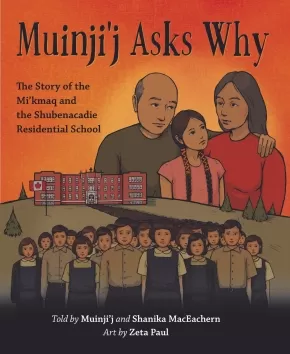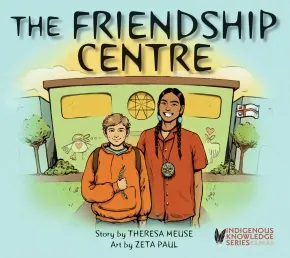
Zeta Paul
Zeta Paul is a Mi'kmaw interdisciplinary artist. She attended The Nova Scotia University of Art and Design and fell in love with creating, through mediums such as illustration, animation, print, photography, and jewellery. Her inspiration often revolves around feelings, memories, nostalgia, intimacy communicated through color, tone and subject matter arranged in a dynamic ethereal manner.
Kids Books (2)
Muinji'j Asks Why: The Story of the Mi'kmaq and the Shubenacadie Residential School
$22.95
Artists:
Format:
Paperback
Text Content Territories:
Indigenous Canadian; First Nations; Mi'kmaq;
ISBN / Barcode: 9781774710470
Synopsis:
Synopsis:
An educational and heartfelt retelling of the story of the Mi'kmaq and their traditional lands, Mi'kma'ki, for young readers, focused on the generational traumas of the Indian Residential School System.
"The story of the Mi'kmaw people is one that very few truly know, Ladybug. Even fewer understand what happened at the residential schools. It is a hard story to tell, but you must know the truth. Sit and I will tell you the story."
When seven-year-old Muinji'j comes home from school one day, her Nana and Papa can tell right away that she's upset. Her teacher has been speaking about the residential schools. Unlike most of her fellow students, Muinji'j has always known about the residential schools. But what she doesn't understand is why the schools existed and why children would have died there.
Nana and Papa take Muinji'j aside and tell her the whole story, from the beginning. They help her understand all of the decisions that were made for the Mi'kmaq, not with the Mi'kmaq, and how those decisions hurt her people. They tell her the story of her people before their traditional ways were made illegal, before they were separated and sent to reservations, before their words, their beliefs, and eventually, their children, were taken from them.
A poignant, honest, and necessary book featuring brilliant artwork from Mi'kmaw artist Zeta Paul and words inspired by Muinji'j MacEachern's true story, Muinji'j Asks Why will inspire conversation, understanding, and allyship for readers of all ages.
Educator Information
Juvenile Nonfiction
Additional Information
40 pages | Paperback
The Friendship Centre
$13.95
Artists:
Format:
Paperback
Text Content Territories:
Indigenous Canadian; First Nations; Mi'kmaq (Mi'gmaq);
ISBN / Barcode: 9781774714416
Synopsis:
Synopsis:
A modern story of traditional Indigenous knowledge from the author of The Sharing Circle that teaches young readers about the importance of the Friendship Centre for urban Indigenous peoples.
Matthew is visiting his uncle in the big city! He can't wait to tour the Friendship Centre, where Uncle Hunter works, and enjoy all the food, activities, and resources it has to offer.
With language classes, drumming circles, feasts, and more, Matthew learns that the Friendship Centre provides a home away from home for urban Indigenous people. It's a space created for Indigenous people by Indigenous people, and Matthew feels welcomed right away. Matthew drums, smudges, and tastes freshly baked bannock, but his favourite parts of his visit are the people he meets.
From the author of Sweetgrass, The Gathering, and The Sharing Circle, and the illustrator of Muinji'j Asks Why, this story welcomes all into a safe and inviting community space.
Educator & Series Information
Recommended for ages 3 to 7.
This book is part of the Indigenous Knowledge Series.
Additional Information
32 pages | Paperback








